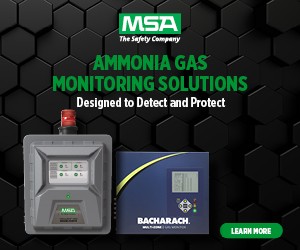IIAR’s Virtual Conference to Deliver Technical Papers, Workshops and Panels
“The topics, workshops and technical papers we would have presented in March are still relevant and already complete,” said Gary Schrift, president of IIAR. “It isn’t about creating completely new content. It is about distributing it differently.”
What’s more, the change from an inperson conference to an online platform has opened up the opportunity for a more diverse audience. “We have, once again, opened up registration for the 2020 event and hope to attract attendees who would not traditionally be able to attend the in-person IIAR conference, due to travel restrictions or budget limitations,” said Eileen McKeown, vice president of marketing and sales for IIAR. “This will be a unique experience for the IIAR as we were given the opportunity to create a new way of presenting content and engaging industry professionals.”
The virtual conference will take place over a three-week period, giving people the ability to spread out the time commitments, Schrift said. Technical papers and the workshop will be broadcast twice during the three weeks, each followed by live question-and-answer sessions with the speakers, providing the live audience an extensive list of opportunities for education.
Unlike IIAR’s in-person conferences that sometimes require attendees to choose between competing programs in the same time slot, no online sessions will be held simultaneously. In addition, replays of content will be available on-demand at the conclusion of the three-week online conference, which will be accessible to 2020 conference registrants until March 2021.
There will also be a virtual booth and exhibition and e-commerce opportunities, so attendees can interact with industry suppliers. Schrift said IIAR is seeking input from sponsors on how to provide a high level of recognition, visibility and support during this conference and especially for the next year. “We’re asking sponsors to give us ideas on what would be most helpful for them.”
“We will still present the technical panels and the Secondary Coolant Systems workshop program we had planned for Orlando, although the workshop program will not be presented on Sunday. All technical sessions will be broadcast on weekdays.” Schrift said. “We plan to have all technical session presenters available during the online event for Q&A sessions. We want presenters to be able to talk to everyone in the audience, and for the audience to provide feedback and ask questions via a chat box, from which the presenters will read and answer.”
McKeown said engaging and educating the refrigeration industry in support of the safe and sustainable use of natural refrigerants is IIAR’s primary goal.
Lowell Randel, director of government relations at IIAR and vice president, government and legal affairs at the Global Cold Chain Alliance, has been working to coordinate panelists for the online sessions, and said the goal is to keep content the same as originally planned. Randel said either he or an agency representative will cover the Environmental Protection Agency’s Risk Management Plan and final rule. “We will make sure members are up to speed on the final rule that came out on the risk management program, which basically removed some of what we viewed as objectionable provisions in the Obama administration’s risk management proposal,” he explained.
Randel said he will dig into the U.S. Chemical Safety and Hazard Investigation Board’s new regulation that requires chemical releases to be reported to the National Response Center as well as the Chemical Safety Board. “I’ll share details on the Chemical Safety Board’s provisions and what our members need to know,” he said.
IIAR will also add new information regarding regulatory and guidance changes brought on by the COVID-19 crisis. “There was an EPA enforcement guidance document put forward during the pandemic that provides some flexibility for regulated facilities and a recognition that there may be things you’re unable to do because of the pandemic,” Randel said. He added that he will offer an update depending on where things stand at the time of the conference. “By the time we do that, I anticipate we will have something from OSHA related to how they are looking at enforcement guidance during the pandemic as well,” referring to the Occupational Health and Safety Administration.
Jeffrey Shapiro, IIAR’s code consultant, will provide his overview on what the 2021 model codes will have to say about ammonia when they are published later this year and will provide a brief update on the happenings within ASHRAE 15 affecting flammable refrigerants and the deletion of ammonia from ASHRAE 15, in favor of referencing IIAR 2.
Model codes operate on a three-year publication schedule, and formal code development activities to update new editions occur during two of those three years. During the third year, informal work is done by various committees and task groups to discuss ideas and develop proposals.
proposals. “2020 is one of those informal preparation years, and fortunately, the COVID-19 ‘stay-safe-at-home’ restrictions have not significantly affected these preparations,” Shapiro said. “In lieu of having in-person committee and task group meetings, work has continued using Web conferencing and conference calls, and it appears that code development for the next [2024] code editions will stay on schedule.”
IIAR members who have registered for the event will be able to access sessions with their IIAR sign-in information through IIAR’s website. Non-member conference registrants will receive an email with instructions on how to login to the conference.
Educational credits will be offered for anyone attending sessions. To receive educational certificates, attendees will submit a code that appears at the end of the session.
Schrift said IIAR looks forward to seeing everyone for IIAR’s 50-year anniversary celebration at the 2021 Conference, which will be held in Palm Springs, California, and will also include a heavy equipment show.











